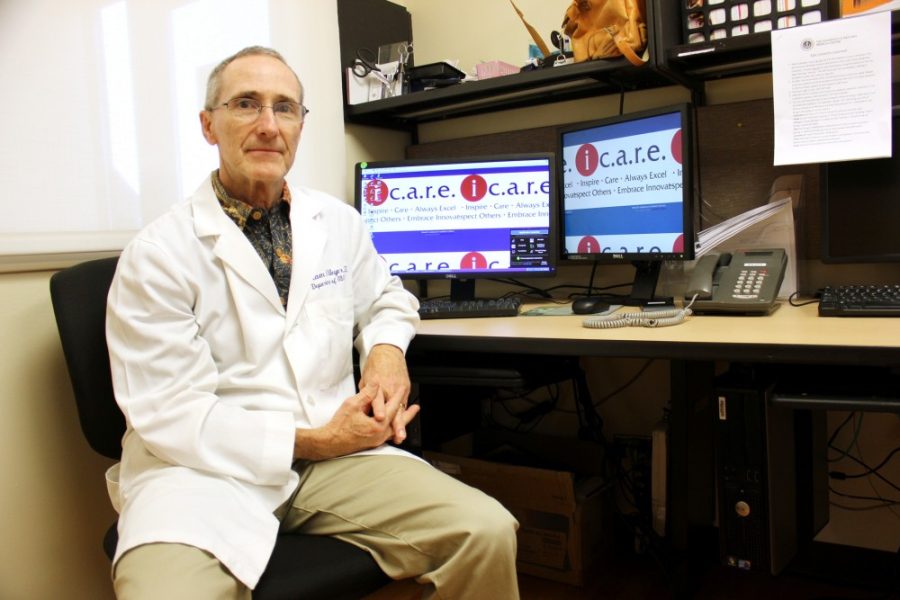Dr. Bill Meyer has been visiting Africa since 2004 to perform surgical procedures.
Meyer, a clinical associate UA professor in the Department of Obstetrics and Gynecology at the UA College of Medicine and a physician at the University of Arizona Medical Center, said he first went to a hospital in Ethiopia nine years ago. He spent two weeks there learning how to do fistula repairs which involve fixing an abnormal connection between organs.
Since his first visit, Meyer said, he’s met other physicians in Africa practicing the same kind of medicine who have periodically invited him back to help with fistula repair surgeries.
Meyer is one of many UA physicians who travel overseas on medical missions. While these programs aren’t run through the UA, physicians in the ObGyn Department often go on the missions, coordinating among themselves when to leave so there aren’t too many doctors gone at any one time, Meyer said.
The ObGyn Department needs at least one doctor on call at all times to help deliver babies, Meyer added. The doctors leaving have to do extra hours to make up for the time lost and have to notify the department four weeks in advance if they’re planning to go on a mission.
Meyer’s most recent mission was in mid-September to Uganda, where he operated on women who had developed vesicovaginal fistulas, which are holes between the bladder and vagina that occur due to labor complications. On his 10-day mission, Meyer treated more than 40 women suffering from this condition, which results in urinal leaking.
While this condition is rare in the U.S., these fistulas are common in African countries like Uganda due to poor medical conditions, Meyer said.
“In the States, these kinds of injuries haven’t happened to women in 130 years,” Meyer said.
Meyer said that while the work he did in Uganda with the fistula repair surgeries was challenging, the facilities he used to do the repairs were sufficient to get the job done.
“Repairing these holes in bladders … is the hardest surgery I’ve done in my entire surgical career,” Meyer said. “I’ve become a better vaginal surgeon back home because of the work I did [in Africa] because of the challenges that kind of work poses.”
Dr. Jessica Moreno, an assistant professor in the Department of ObGyn and a physician at UAMC, said she shares Meyer’s sentiments about the difficulties of international medicine. She has previously done work in Peru, helping train and certify local health care workers in prevention strategies against cervical cancer using methods more helpful to rural areas.
“Getting to these remote areas can pose a challenge,” Moreno said. “The journey is long and the roads are not always good.”
The training and preparation that go into these medical missions overseas can be extensive, Moreno added. Her process in Peru involved getting community leaders to back the doctors’ efforts and promoters to help educate others and dispel misconceptions, among other things, in order to get people involved in the cervical cancer screenings.
“Training local providers to do sustainable projects to improve the health of their communities is most rewarding,” Moreno said.
Two other members of the ObGyn Department are currently doing similar work overseas. The UA has been accommodating to this kind of work, Meyer said, adding that the reason he doesn’t go back sooner is simply to help out the department.
“The UA has been incredibly gracious to allow me to take time off to go to Africa and do these surgeries,” Meyer said.
Kim Maxwell, senior program coordinator at the ObGyn Department, said it is not uncommon for staff at the College of Medicine and UAMC to go on international medical missions.
“We have many physicians throughout the [ObGyn] Department serve internationally,” Maxwell said.
Some said that, despite the challenges facing doctors who practice this kind of international medicine, the experience is rewarding.
“Without a doubt, seeing the faces of these women in the post-operative rounds … [affirms] it’s the most gratifying procedure I’ve done in my medical career,” Meyer said.









